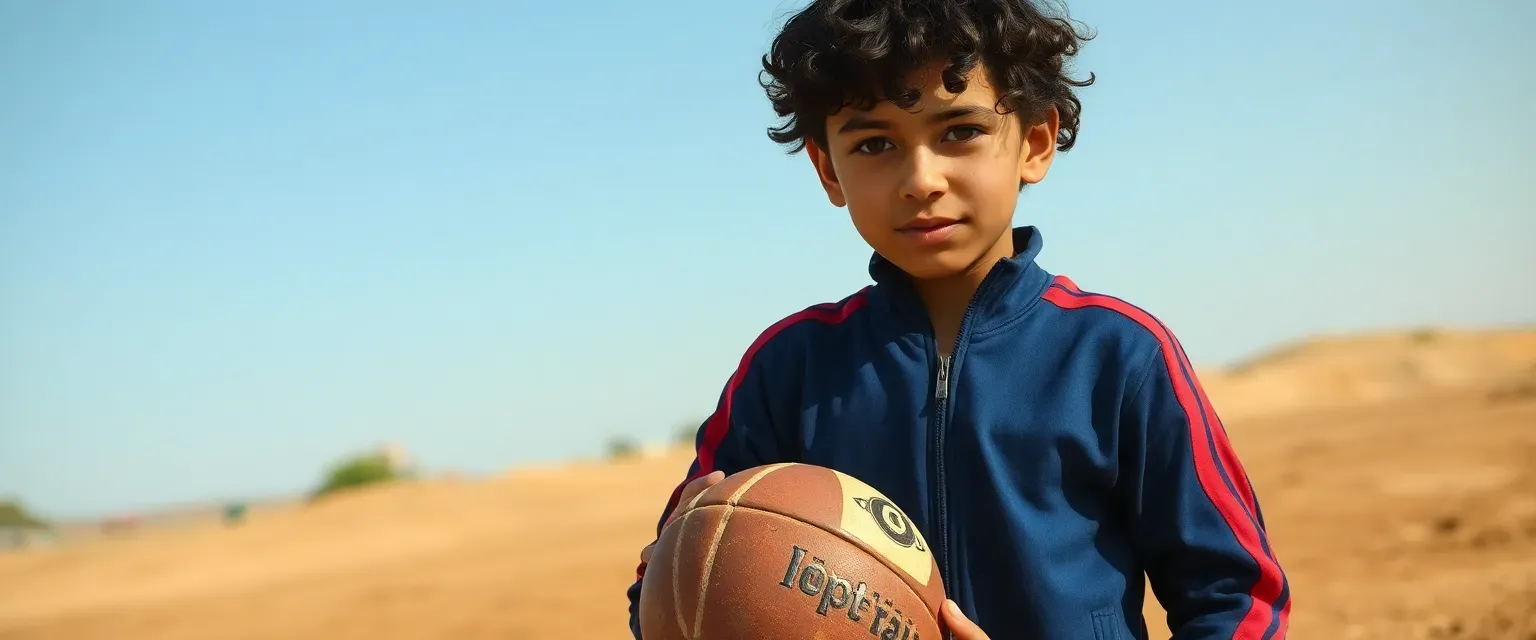In the sun-baked outskirts of San Martín del Prado, where the olive groves stretched like weary sentinels under the relentless Castilian sky, lived Álvaro Sánchez, a lanky fifteen-year-old with the fire of unquenched dreams burning in his hazel eyes. His frame was that of a boy caught between childhood and the harsh forge of adolescence—tall for his age at five-foot-nine, but wiry, with shoulders that hinted at the strength yet to come from endless hours on the pitch. His skin was tanned to a deep bronze from afternoons chasing a ball under the merciless Spanish sun, and his dark, unruly hair fell in sweat-matted curls over a forehead perpetually creased in concentration. Álvaro's face bore the subtle scars of youth: a faint freckle across his nose from summer games, and a small, jagged mark on his chin from a tumble during a particularly fierce match two years back. He dressed simply, as befitted a boy from a modest home—a faded blue tracksuit from the local kit supplier, scuffed trainers that had seen better days, and always, slung over one shoulder, a battered football, its leather cracked like the parched earth around his village.
Álvaro's world was a tapestry woven from loss and longing. His mother, Marta, a nurse at the clinic in nearby Getafe, rose before dawn each day, her hands callused from years of tending the sick, her eyes shadowed by the weight of widowhood. Juan, Álvaro's father, had been taken from them in a screech of twisted metal on the highway to Madrid when Álvaro was just eight—a truck driver whose final journey left behind a void that no amount of Marta's quiet resilience could fill. No siblings shared the small, whitewashed house on the edge of town; it was just the two of them, bound by shared silences and the echo of Juan's laughter in old photographs. Football became Álvaro's anchor, a ritual that pulled him from the grief that clung like morning mist. He played for the junior team in Getafe, the closest city with a proper club, traveling by bus each weekend, his heart pounding with the rhythm of the game.
But beneath the thrill of the pitch lay a deeper yearning: to rise above the ordinary, to honor his father's memory by making it big, perhaps even catching the eye of a scout for a top league side. Juan had dreamed of seeing his son play professionally, whispering tales of glory during bedtime stories before the accident shattered everything. Álvaro wanted that legacy, to feel the roar of a stadium, to prove that the Sánchez name could shine again. Yet shadows dogged his path. Shyness wrapped around him like a second skin, making him falter in tryouts, his voice catching when coaches barked orders. The team was a rough bunch, older boys from the city's underbelly who mocked his village accent—a soft, rolling drawl from San Martín that marked him as an outsider. And then there was the grief, a phantom ache that surfaced in quiet moments, sapping his focus during crucial plays. School in the local high offered no respite; bullies sniffed out his quiet nature, and even his one true friend, Nicolás García, shared the same reticence, their bond a fragile thread of whispered conversations and shared kicks in the schoolyard.
Twice a week, Álvaro and Nicolás escaped to the dusty field behind the village church, where the ball became their language. Nicolás, with his quick wit hidden behind glasses and a mop of blond hair, urged Álvaro on, their friendship a bulwark against isolation. It was in these moments that Álvaro found his resolve. He trained harder, rising at dawn to jog the winding roads, his breaths syncing with the mantra of his father's old advice: 'El fútbol no espera, hijo.' He pushed through the shyness, volunteering for penalty kicks, his unique quirk—a nervous habit of twisting the hem of his jersey when anxious—becoming a talisman rather than a tell. Why did it work? Because in the sweat and struggle, Álvaro glimpsed the man he could become, his persistence chipping away at doubt like waves eroding stone. The conflicts piled high: Marta's exhaustion threatening to pull him from the team for extra shifts at home, the coach's favoritism toward bolder players, and the ever-present specter of failure that whispered of a life forever tethered to the village's quiet despair.
Yet Álvaro pressed on, his arc bending toward quiet triumph. In a regional tournament, under floodlights that turned the pitch into a stage, he scored the winning goal—a curving shot born of sheer will—that propelled his team to victory. It wasn't stardom, not yet, but it was a spark. The coach noticed, Nicolás beamed with pride, and Marta, watching from the sidelines, allowed herself a rare smile. The end came not in glory's blaze but in subtle transformation: Álvaro stood taller, his shyness tempered by purpose, the grief a companion rather than a chain. In San Martín del Prado, where dreams often withered like untended vines, Álvaro Sánchez learned that the greatest victories were forged in the heart's unyielding beat.
